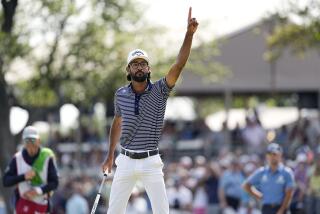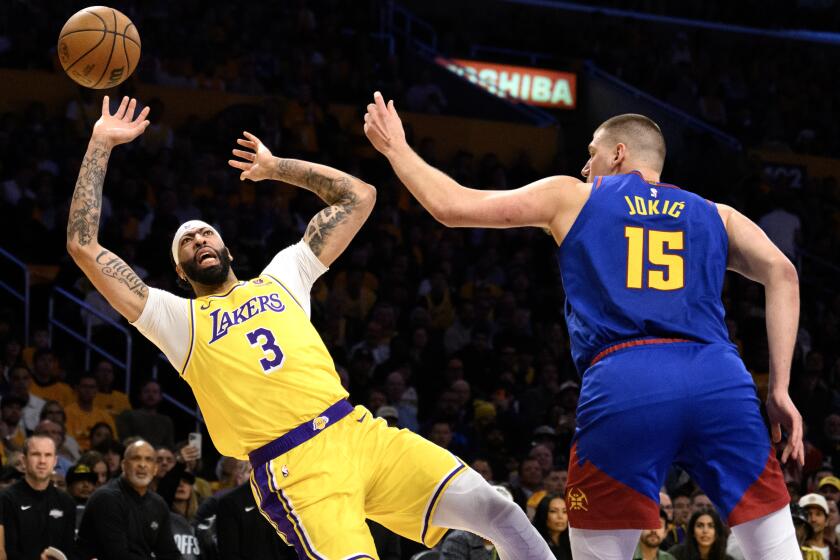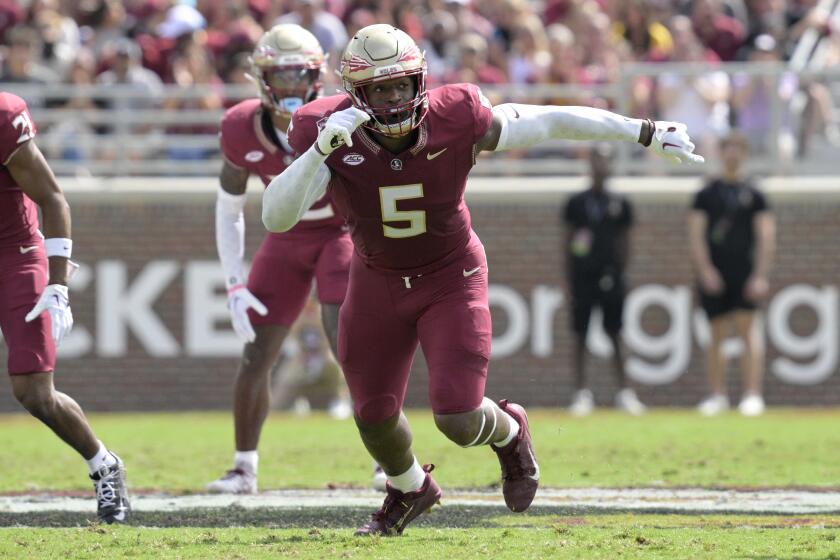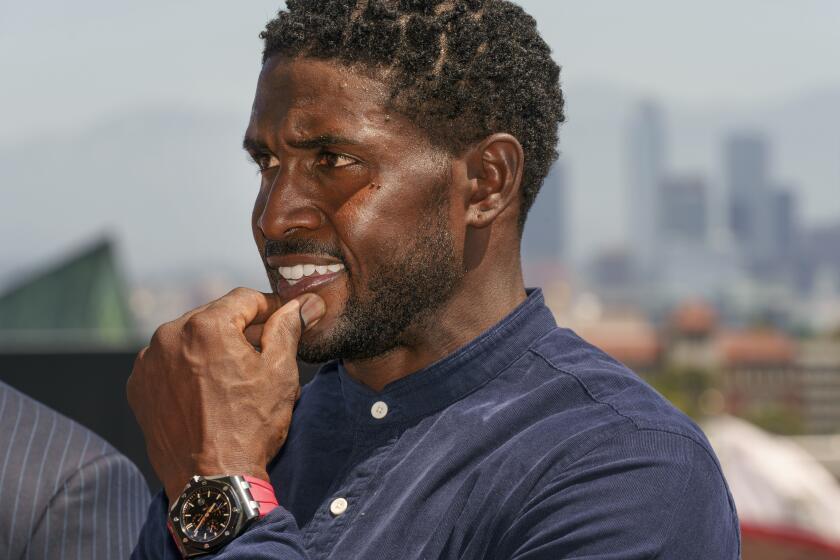Column: History is there for taking for the amazing Jordan Spieth at British Open

Jordan Spieth lines up a putt on the 11th green during the third round of the British Open at St. Andrews, Scotland, on Sunday.
Jordan Spieth continues to make the amazing look ordinary. Whatever planet the golf gods dropped him from, we beg for more.
He doesn’t lead the British Open going into Monday’s final 18 holes. He isn’t driving the ball past everybody or knocking down pins from bunkers. He isn’t dazzling Brit reporters with cheeky quotes.
He’s just the story. There is no denying it.
He’s the player they are talking about, the one sending the toughs in the gallery, the ones in stocking caps and with a beer in each hand, to the greenside railings, muscling their way to get a better look.
It is hard to know whether to be more impressed with his talent or his consistency. A colleague, Ron Borges of the Boston Herald, calls him the metronome. Putter back. Putter through. Ball in cup.
After the cut, there were 80 players in the field Sunday and 63 broke par. It was a day of benign weather and sensational golf. The highest score was 76.
The three leaders were each headline material.
Louis Oosthuizen won the Open Championship the last time they played it at St. Andrews in 2010. Ran away from the field, as a matter of fact. Then he mostly disappeared into pro golf’s talent pack. Sunday, he shot five-under 67 and was 12 under par.
Jason Day showed the courage of a mountain climber at the U.S. Open, playing on through a debilitating bout of vertigo and gaining the respect of all sports fans. Sunday, he shot 67 and was 12 under par.
Paul Dunne, a 22-year-old amateur from Dublin by way of the University of Alabama Birmingham, never folded, never blinked. He shot 66 and was 12 under par.
Then, there was Spieth. He made seven birdies and one bogey, made gut-testing par putts on Nos. 13, 14 and 17, shot 66, and was one back at 11 under par.
There was a huge difference. He did it carrying the heaviest of weights. He was American Pharoah racing with 150 pounds, LeBron playing with leg weights. The other guys played incredible golf. Spieth did so with the ghosts of Ben Hogan and Bobby Jones resting on his shoulders, every time he lifted a club.
And he is 21 years old, not 35. Or 45.
This is the deal, in case you’ve been on the moon.
Spieth won the Masters. Then he won the U.S. Open. Now he can make it three majors in a row in the same year. The last time that was done was by Hogan in 1953. The last time somebody won all four majors in a year was 1930, when Jones did it in the amateur era.
Also, Spieth is trying to make history at golf’s most historic site, the birthplace of the game, the Old Course at St. Andrews, where Old Tom Morris was hitting it stony long before we had even bothered to get that Civil War thing sorted out.
Almost anybody else would have long ago wilted under the pressure here, would have run screaming after the 500th question about whether he thought he could handle it. For others, this stage would have been way too big.
So far, not for Jordan Spieth, of Dallas, Texas, son of Chris and Shawn, brother of Steven and Ellie.
Maybe Monday’s final round will bring the call to reality, the realignment of stars. Maybe not.
Listen to Spieth’s response to a question about the stress of this pursuit of history, and how he intends to not let it affect him.
“It hasn’t come up in my head while I’ve been playing yet,” he said. “I can’t speak for tomorrow, given it’s the last round. . . . If it creeps in, I’ll embrace it.
”. . . I don’t look at it as a negative thing. I look at it almost as an advantage. Why should it add more pressure in a negative way? If it adds more pressure, it makes me feel like this is something a little more special, so let’s go and get the job done.”
It’s not pressure, it’s an opportunity?
When was the last time you heard somebody in sports say something like that? The sort of thing Spieth faces almost always brings duck-and-run time, the minimize-and-deny approach.
Serena Williams was going for the third leg of the tennis Grand Slam last weekend at Wimbledon. Until she achieved it, the word “Slam” was not allowed anywhere near her, especially from the media. That’s the norm, probably the path most recommended by sports psychologists.
That’s not Spieth’s path.
Not only was he asked about it often, but he was asked to articulate his understanding of the magnitude of all this.
His response: “I see something that’s only been done once before [Hogan], and it was a long time ago. I think, to be in that category of having done something you love and that you are doing for your life, [and] only one person has [done it], that opportunity very rarely comes around. I’d like to have a chance. . . .”
Tomorrow may bring bad bounces and chunked chips and too much time spent in rough. It may bring chilling rain and nasty wind, maybe both at the same time. It seems unrealistic that Spieth can continue what he is doing, in the manner in which he is doing it, in yet another glass cage with all the bright lights turned on.
Monday, that will be the scene.
You wonder if Ben Hogan and Bobby Jones have a special table reserved up there, one close to the bar and the big-screen TV.
You wonder if they’ll even make room for Old Tom Morris.
Twitter: @DwyreLATimes
More to Read
Get our high school sports newsletter
Prep Rally is devoted to the SoCal high school sports experience, bringing you scores, stories and a behind-the-scenes look at what makes prep sports so popular.
You may occasionally receive promotional content from the Los Angeles Times.







